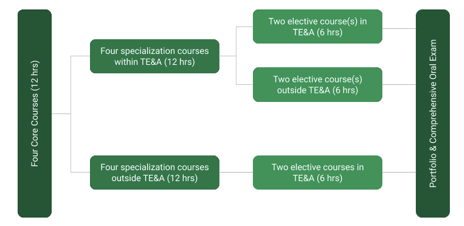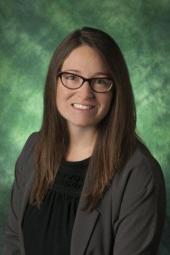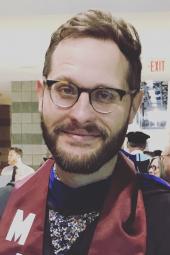Program Composition
Program Composition

The M.Ed. in Curriculum and Instruction requires students complete 30 hours of coursework that includes 12 hours of core courses, 12 hours of specialization courses, and 6 hours of electives. Courses are typically three credit hours each. If a specialization is outside the department then students must take both their electives in the department. Full time enrollment requires 9 hours. While time requirements vary from week-to-week and course-to-course, students should expect to dedicate considerable attention to their course each week. The portfolio and comprehensive oral exam (non-credit) must be completed in the graduating semester at the scheduled time.
Core Courses
Core Courses (12 hours)
All students must take the following four core courses that aim to offer foundational understandings of topics integral to curriculum and instruction:
- EDCI 5130: Schooling in a Multicultural Society (Spring semester)
- EDCI 5320: Curriculum Development (Fall, Summer semesters)
- EDCI 5360: Advances in Teaching (Spring semester)
- EDCI 5710: Research in Classroom Settings (Fall semesters)
These four core courses are offered online on a regular rotating basis as indicated in parentheses above.
Specialization Areas Outside the Department
Specialization Areas Outside the Department
Students can choose specialization areas outside the TE&A department for multiple reasons. One potential benefit is that if students take 12 hours in a specific discipline (e.g., U.S. History, Chemistry) which leaves them 6 hours away being qualified to teach at either at community colleges or dual enrollment with high school. Examples of such specializations include:
*Instructional Technology: For those who would like a better understanding of effective integration of education and technology. Some of these courses may lead to supplemental certification as a Master Technology Teacher.
Possible Courses:
- CECS 5010: Computer Education Tools CECS 5020: Computers in Education CECS 5030: Foundations of Learning Technologies
- CECS 5110: Multimedia in Technology Applications
- CECS 5111: Introduction to Video Technology
- CECS 5500: Computer Applications for Curriculum and Instruction
Required elective courses:
- TBD
- TBD
Social Studies: This specialization allows students to increase their content knowledge in a social science discipline(s) (e.g., history, geography, economics, political science, anthropology), which can lead to meeting qualifications to teaching courses at the community college level. Students may also enroll in an array of courses across disciplines. Two social studies elective classes and offer students opportunities to learn about the field and turn content classes into curriculum.
Possible specializations:
- U.S. History
- Economics
- Geography
- Anthropology
Required elective courses:
- EDCI 5900: Social Studies Curriculum and Pedagogy (Must be enrolled in final specialization courses to enroll)facili
- EDCI 5900: Social Studies Foundations (Fall semester)
Elective Courses Note: For specializations within the department, students can enroll in additional courses in their specialization or other graduate-level courses as approved by their advisor.
Other Specialization Areas: In addition, the Department of Teacher Education and Administration can assist students in developing an individualized specialization area that addresses their needs. For example, students have specialized in the following areas:
- Anthropology
- Content Areas in Middle or Secondary Education (similar to social studies specialization above)
- Counseling
- Gifted and Talented Education
- Special Education
Finding Courses: Students should work with their advisor to identify appropriate courses. Students can search for online courses (https://online.unt.edu/online-courses) or classes in general (https://registrar.unt.edu/registration/schedule-of-classes). Students may need to e-mail the department or instructor to verify that non-education courses are open to non-majors and also identify the semesters in which courses are offered.
Elective Courses
Elective Courses (6 hours)
Students enroll in two elective courses for 6 credit hours. If the specialization area is outside the Department of Teacher Education and Administration then elective courses must be completed within TE&A. Approved TE&A courses include those with EDCI, EDEC, EDRE, EDBE, and EDLE prefixes, as well as some EDSE courses. Specialization advisors can help students identify appropriate elective courses and details are provided in the prior section.
Course Formats: The program offers online, face-to-face, and hybrid course formats.
- Fully online courses do not include regular face-to-face meetings. All course work is completed in Canvas, an online learning management system. Some courses may include synchronous online meetings or opportunities to attend optional on-campus meetings. All core courses are online as well as the courses in many specialization areas.
- Face-to-face courses meet every week, and may or may not include online components. During Spring and Fall long semesters, face-to-face courses meet one evening a week for 2 hours and 50 minutes. No core courses meet face-to-face so students can graduate without taking any face-to-face courses.
Portfolio & Comprehensive Oral Exam
Portfolio & Comprehensive Oral Exam
Overview: In their graduating semester, students must exhibit their mastery of the five program goals through the completion of an online portfolio and comprehensive oral exam. The purpose of the portfolio and comprehensive oral examination is to provide a capstone learning experience of the program. It is a summative evaluation of the student’s professional growth and development during the M.Ed. program as students demonstrate mastery of the five program goals. Students turn in an online portfolio completed through Foliotek one week prior to the comprehensive oral exam date. The comprehensive oral exam consists of a 20-minute presentation displaying mastery of the program goals. This exam is not credit-bearing and thus students do not have to enroll in any courses to meet these final program requirements. However, all students must complete the exam to graduate.
Foliotek e-Portfolio: Foliotek is a software data management system (DMS) used in the assessment of your knowledge, skills, and dispositions relevant to program standards and objectives. You will be required to use your Foliotek account for the duration of your enrollment in the College of Education in order to upload required applications, course assignments, and other electronic evidences/evaluations as required. All students must register in the program portfolio that aligns with their degree plan. Registration codes and tutorials can be found on this site: https://coe.unt.edu/educator-preparation-office/foliotek. Contact Alyssa Strong (alyssa.strong@unt.edu) for assistance in setting up e-portfolio templates.
Comprehensive Oral Examination: Comprehensive examinations will typically be held in late September for Fall graduates, and the late February for Spring graduates. Students who complete their course work in Summer may request to complete the exam in the February before the final semester of classes or in the September after completing classes, but there will not be separate examinations scheduled except in extraordinary circumstances. Departmental deadlines for the completion of the exam are based on the requirements of the graduate school and may change based on reporting requirements. The facilitator for the M.Ed. program will announce the locations and more specific times for the comprehensive examinations at the beginning of the semester. The comprehensive exam period(s) will be two hours in length and attended by up to four students and three faculty assessors.
Policy and Procedures
- Exam Date: Students should complete the comprehensive exam the semester course work is completed. Students will be contacted by the administrative specialist about the date for the comprehensive exam and make arrangements to attend at the scheduled time. Students should also check with the graduate school to register for graduation.
- Exception Requests: Students must e-mail the program facilitator to request completion of the comprehensive oral exam at any other time than the date scheduled during their graduating semester. The request should include a detailed explanation of the reasons why the student cannot complete the exam at the scheduled time. The program facilitator will respond with a plan for completing the exam. Unless the circumstances were unavoidable, students will likely be advised to wait until the next scheduled comprehensive oral exam date to meet the requirement.
- Exam Orientation: Prior to the semester in which the students intend to graduate, the students will attend an orientation to learn about the development of the portfolio and the specifications of presenting the comprehensive exam.
- Foliotek and Program Goals: Each graduating student will prepare a portfolio using the Foliotek platform provided by the university. Access to the portfolio is found by going to my.unt.edu; ePortfolio module. The portfolio will be divided into five sections, each representing the five goals of the program. Into each of the five sections, the goal will serve as the descriptor for the sections. In each section, 1-2 artifacts from courses completed during the degree will be included as representative of addressing the attainment of the goal. In each of the sections, a narrative describing in detail how and why the artifact aligns with the attainment of the goal will also be included. The completed portfolio is submitted to the administrative specialist one week prior to the oral presentation. The administrative specialist will distribute the portfolios to the panel of faculty. Faculty will read the portfolio prior to attending the oral presentation.
- Presentation Blocks: The exam will be administered in a block with all students presenting. Students should expect to attend the full block of time.
- Presentation Time: Students will present to a group of faculty members and other students for a total of approximately 30 minutes. Students should prepare a 20-minute presentation and leave 10 minutes for answering questions. The presentation can be in the form of a PowerPoint, graphic organizer, pictures, or without digital visuals. As the presentation is organized, students should ensure the five goals are presented in 20 minutes in the time allotted.
- Faculty Scorers: A minimum of three faculty members will score each student’s exam using the rubric below. The program will attempt to ensure that a faculty member with expertise in the student’s subject area (if within the LLBE, EDRE, or EDCI umbrella) evaluates the exam.
- Results: Students will be notified by email within a week after the exam whether they passed, failed with the option to present additional documentation, or failed.
- Additional Documentation: Students who fail with the option to present additional documentation during the same semester will have one week to present the additional documentation to the program administrative specialist. The materials will be reviewed by the faculty members who evaluated the original examination. The student will be notified of the committee’s decision within two weeks from the original comprehensive exam. Submitting additional documentation does not count as an exam retake. Students who fail after submitting additional material will have the opportunity to retake the exam when it is next offered.
- Exam Retakes: Students who fail the exam on the first attempt will have the option to retake the next semester in which it is offered. Students who only need to pass the comprehensive exam to graduate do not have to enroll in additional course work to retake the exam. Students will be allowed to retake the exam one time within one year of the first attempt.
- Program Dismissal: Students who fail the exam twice will not be allowed to retake the exam and will be dismissed from the program.
FAQs about the Comprehensive Exam
- What are the requirements that must be completed before M.Ed. students can take the comprehensive exam? Students need to be in good standing and must be in the last semester of course work.
- When and where is the exam offered? The exam is offered on the UNT campus during non-business hours, but videoconferencing options may be available for distance learners. The time and place of the exam are announced at the beginning of the semester. During a two-hour exam period, up to four students will make 30-minute oral presentations.
- How do students “apply” to take the exam? Students need to submit an application to take the exam to C&I administrative staff prior to the beginning of their final semester of course work.
- What areas does the exam cover? The examination covers the five C&I program goals as they relate to the student’s area of specialization.
- How is the exam structured? The exam consists of a 30-minute presentation during which the student will demonstrate mastery of the five program goals. Presentations should be explicitly organized around the five goals. Comprehensive exam presentations are public and may be attended by program faculty and other students. Examinees should be prepared to answer questions about their presentations.
- What formats are accepted for the presentation? Examinees should check with their advisor regarding the technology available for the comprehensive exam. In general, computers, projectors, and Internet access will be available in the meeting room.
- How can a student best prepare for the comprehensive examination? Students should familiarize themselves with the exam requirements and rubric as they enter the program. Activities in the core courses are designed to support the program goals and can provide artifacts for the comprehensive exam. Students should consider the ways in which activities in their selected specialization and elective courses also promote these goals. Program faculty can assist students in identifying how course assignments support program goals and may be used for the comprehensive exam. Prior to the exam, students will complete a program goal chart to help plan for the comprehensive exam and to provide to faculty evaluators during the exam. Students should maintain copies of artifacts produced in classes, as well as feedback from instructors. Additionally, students may wish to maintain evidence of professional growth and achievements related to program goals, but conducted outside of courses. During the semester in which the student plans to complete the comprehensive exam, the student will prepare a presentation using artifacts collected during the program as evidence of progress toward program goals.
Rubric: Faculty will use a scoring rubric to evaluate students for the comprehensive exam. The rubric to be followed is below.
|
Goal |
Description |
Rating (Check One) |
Evidence/ Comments |
|
1. Teachers understand the relevance of research and theory to practice. |
|
Meets expectations: Student clearly presents evidence that the goal was met in terms of knowledge, understanding, professional application, and reflection. Unsatisfactory:—Student presents inadequate or no evidence that the goal was met. Recognition of Excellence: Evidence indicates student has exceeded expectations for this goal. |
|
|
2. Teachers understand major theories of curriculum and instruction both within and beyond the state curriculum. |
|
Meets expectations: Student clearly presents evidence that the goal was met in terms of knowledge, understanding, professional application, and reflection. Unsatisfactory:—Student presents inadequate or no evidence that the goal was met. Recognition of Excellence: Evidence indicates student has exceeded expectations for this goal. |
|
|
3. Teachers can justify instructional decisions in terms of relevant research and theory, curriculum, and student needs. |
|
Meets expectations: Student clearly presents evidence that the goal was met in terms of knowledge, understanding, professional application, and reflection. Unsatisfactory:—Student presents inadequate or no evidence that the goal was met. Recognition of Excellence: Evidence indicates student has exceeded expectations for this goal. |
|
|
4. Teachers become agents of change in their school communities. |
|
Meets expectations: Student clearly presents evidence that the goal was met in terms of knowledge, understanding, professional application, and reflection. Unsatisfactory:—Student presents inadequate or no evidence that the goal was met. Recognition of Excellence: Evidence indicates student has exceeded expectations for this goal. |
|
|
5. Teachers gain expertise and assume roles that strengthen the profession. |
|
Meets expectations: Student clearly presents evidence that the goal was met in terms of knowledge, understanding, professional application, and reflection. Unsatisfactory:—Student presents inadequate or no evidence that the goal was met. Recognition of Excellence: Evidence indicates student has exceeded expectations for this goal. |
|
|
Number of goals met: _______________________________________/5 Circle One: Pass Resubmit Fail General Comments |
|||


